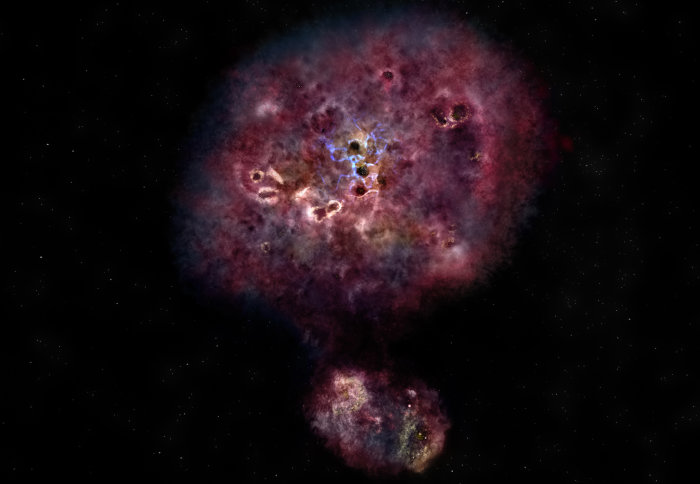New galaxy observations and secrets of skin: News from the College

Image credit: NRAO/AUI/NSF, B. Saxton
Here’s a batch of fresh news and announcements from across Imperial.
From observations of a distant star-forming galaxy, to a new documentary featuring Imperial bioengineering, here is some quick-read news from across the College.
Distant, dusty galaxy
Astronomers, including some from Imperial, have spotted the light of a massive galaxy seen only 970 million years after the Big Bang. This galaxy, called MAMBO-9, is the most distant dusty star-forming galaxy that has ever been observed without the help of a ‘gravitational lens’.
Gravitational lensing is when the light of a galaxy is bent by the mass of a galaxy in front of it, making it easier to find, but distorting the details. Now, ten years after its light was first observed, the team have identified MAMBO-9 as a very dusty star-forming galaxy and determined how far away it is, providing its age. They were also able to measure its mass as ten times more than all the stars in the Milky Way.
Read more from the National Radio Astronomy Observatory.
Dyslexia Awareness

In a talk delivered to mark Disability History Month, entrepreneur Elizabeth Takyi discussed her late dyslexia diagnosis and how employers can better support those with the learning difference.
Having left a job due to her dyslexia, Elizabeth wondered how many other people had struggled to reach their full potential because of the learning difference. Elizabeth went on to set up Aspire2Inspire Dyslexia, which offers support to dyslexic adults who want to return to education or work.
Elizabeth stressed that dyslexia does not look the same for everyone: "Support should be tailored to the individual, tackling the barriers they feel are affecting them most. Make no assumption about their capabilities, or aspirations."
Business magazine
 Imperial Business 2020, Imperial College Business School’s annual magazine, is out now. It looks at the theme of sustainable business, from air pollution to the newly launched sustainability research centre.
Imperial Business 2020, Imperial College Business School’s annual magazine, is out now. It looks at the theme of sustainable business, from air pollution to the newly launched sustainability research centre.
It explores the impact of machine learning and how data science can help solve many of the world’s most pressing challenges. Also included are profiles of Professor Maurizio Zollo, the new Head of the Department of Management and Scientific Director of the Leonardo Centre, and Dr Harveen Chugh, entrepreneurship expert and one of Poets & Quants’ Best 40 Under 40.
The 2020 issue of Imperial Business is available around the Business School, you can also read Imperial Business magazine online.
Feeding Africa
 A new book by Imperial’s Professor Sir Gordon Conway, Dr Katrin Glatzel, Program Head of the Malabo Montpellier Panel (and Imperial Visiting Researcher), and Dr Ousmane Badiane, Director for Africa at the International Food Policy Research Institute, explores the concept of sustainable intensification (SI) for African farmers.
A new book by Imperial’s Professor Sir Gordon Conway, Dr Katrin Glatzel, Program Head of the Malabo Montpellier Panel (and Imperial Visiting Researcher), and Dr Ousmane Badiane, Director for Africa at the International Food Policy Research Institute, explores the concept of sustainable intensification (SI) for African farmers.
Food for All in Africa lays out ideas and methods for sustainably transforming Africa’s agriculture sector and the livelihoods of millions of smallholders, by producing more with less, using fertilisers and pesticides more prudently, adapting to climate change, improving natural capital, adopting new technologies, and building resilience at every stage of the agriculture value chain.
Pick up a copy of Food for All in Africa.
Secrets of skin
 Dr Claire Higgins from Imperial’s Department of Bioengineering, featured in a new BBC4 documentary ‘Secrets of Skin’ on Sunday 15 December.
Dr Claire Higgins from Imperial’s Department of Bioengineering, featured in a new BBC4 documentary ‘Secrets of Skin’ on Sunday 15 December.
The episode included new work from her research group that could inspire re-engineering of stump skin for more comfortable prosthetics – using skin from the sole of the foot as a template.
Dr Higgins, who led the new research, said: “It was a great experience to work with the BBC and have the opportunity to showcase our work to such a large audience.”
–
Want to be kept up to date on news at Imperial?
Sign up for our free quick-read daily e-newsletter, Imperial Today.

Article text (excluding photos or graphics) © Imperial College London.
Photos and graphics subject to third party copyright used with permission or © Imperial College London.
Reporter
Caroline Brogan
Communications Division
Hayley Dunning
Communications Division
Rhys Purtill
Campus Services
Alix Goodwin
Academic Services
Madeleine Stone
Business School